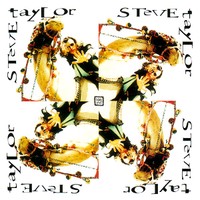Steve Taylor
Table of Contents
Albums
Squint (1994)

- “Lament of Desmond R.G. Underwood—Frederick IV”
- “Bannerman”
- “Smug”
- “Jesus Is For Losers”
- “Finish Line”
- “Moshing Floor”
- “Easy Listening”
- “Curses”
- “Sock Heaven”
- “Cash Cow (A Rock Opera In Three Small Acts)”
“You think this is stupid, don’t you?”
When I first heard this record ten years ago, I was hooked by the music but only mildly amused and mostly confounded by the lyrics. At 20, the music sounds somewhat dated and overproduced to me, but Steve Taylor’s acidic sarcasm and bone-dry wit only now make sense. Sporting the attitude of an anarchist tenth grader and the voice of a tortured cat, he nails each track with a precarious balance of sincerity and unrestrained glee at each point of satire, including himself.
This is Taylor’s masterpiece: ten amazing, self-sustaining yet entirely cohesive odes to the bizarre - from the blistering opening guitar riff on "Lament," designed to scare away any fundamentalist Christian over 25; to the rock-solid anchor "The Finish Line" (Taylor’s own favorite, and best song); to the utterly bemusing closer "Cash Cow (A Rock Opera in Three Small Acts)," the album is all Taylor, in top form.
Reviewers tend to focus on Taylor’s writing, which is absolutely brilliant in every aspect, but rarely mention that he sets his words to melodies that won’t leave your head. Every track on Squint is memorable, with the possible exception of "Curses," a dreary and elusive essay on the blight of irresponsible fatherhood in modern America. Similarly, "The Moshing Floor" feels dated as a satire on Generation X, but its unbridled energy and claustrophobic chorus are undeniably cool (and make a nice segue into the lethargic "Easy Listening").
The biggest gripe most reviewers and fans have about Squint is "Sock Heaven." It’s the strangest song on the album (not that it’s sorely out of place), perhaps because Taylor’s falsetto backed by a Gospel choir give an unsettling, ethereal sincerity to a song about laundry. It’s obviously a metaphor, but if anyone else has it figured out, I suggest you e-mail me so I can congratulate you for being one of the few Christians capable of outside-the-dryer thought.
Taylor’s big secret is that this is a Christian album - sort of. From the acrid "Smug" deriding a "Mr. Limbaugh," to the paradoxically-titled "Jesus Is for Losers," to the brutally anti-establishment "Easy Listening," Taylor knew "Squint" wouldn’t break the Gospel charts and definitely wouldn’t get airplay; this was, in fact, his last album before retiring from mainstream Christian music, disillusioned with his fellow artists’ overwhelming desire to gain acceptance in the secular market, and an audience that couldn’t accept his strange brand of fringe (or should I say fritz) politics. It’s a sad indictment of the modern Christian art realm that, even ten years later, it can’t stomach Steve Taylor anymore than it could a Charlie Peacock or a Kevin Max.
Squint is easily recommended for ten of the most creative songs you’ll ever hear. I have a special appreciation for Cash Cow, the exhilarating, maddening, strangely hilarious "rock opera" that closes out the album (and Taylor’s career as a solo artist). It’s the pinnacle of his jaded assaults on the self-contented religious rich, the Pharisees of 20th century America. Building from an Orwellian-industrial voiceover intro and feverishly accelerating to a cacophony of voices, the song culminates in his career sign-off: "I too was hypnotized / by those big cow eyes / the last time I uttered / those three little words / I deserve better!"
It’s a groundbreaking track, but criminally unfinished, with a 19-second intro and a short guitar solo serving as the first and third "acts," respectively. It would still make a fantastic concept album (a first for the genre), but, as Taylor surmised, the industry ground obviously isn’t fertile for that type of venture.
I admire most those artists who escape the CCM industry and still maintain their integrity, exiled to that creative wilderness beyond the scorn of secular critics and the Christian establishment’s pious reproach, where they can write honestly and without the need to please a mass audience. Bob Dylan’s currently camped out there, so Taylor can consider himself in good company.
Last modified on Sunday, December 5, 2021.